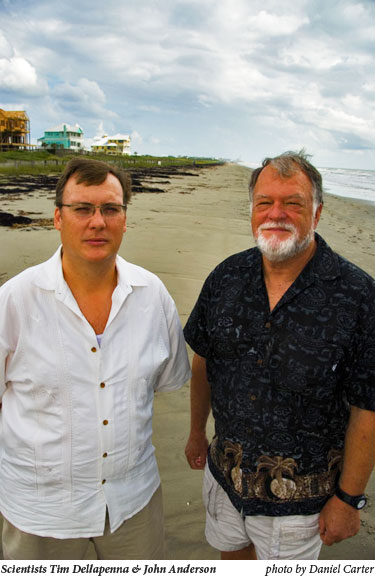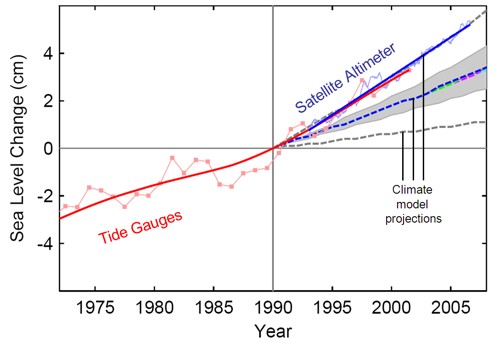Texas Agency Censored Rice Scientist
The scientific malpractice at TCEQ achieves an astonishing new low.

While Rick Perry’s appointees at the Texas Commission on Environmental Quality accuse the EPA of engaging in “bad science,” it now appears that TCEQ officials censored a Rice University scientist. The Houston Chronicle has this shocking story today:
GALVESTON – A long-awaited report on Galveston Bay is being delayed by accusations that Texas’ environmental agency deleted references from a scientific article to climate change, people’s impact on the environment and sea-level rise.
John Anderson, the Maurice Ewing professor of oceanography at Rice University and author of the article, accused the Texas Commission on Environmental Quality of basing its decision to delete certain references on politics rather than science.
“I don’t think there is any question but that their motive is to tone this thing down as it relates to global (climate) change,” Anderson said. “It’s not about the science. It’s all politics.”
The article has several references to climate change but does not say it is caused by humans. However, other references to the impact people have had on the environment were deleted by TCEQ.
TCEQ spokeswoman Andrea Morrow gave no reason for the deletions in an e-mail response, saying only that the agency disagreed with information in the article.
“It would be irresponsible to take whatever is sent to us and publish it,” she said.
This is serious business and represents a new low for the highly-politicized agency. As Anderson told TCEQ commissioner Buddy Garcia in an August 30th letter, “Preventing me from publishing this chapter in its current form is a clear case of censorship, which we academicians take very seriously.”
Incidentally, I interviewed Anderson at length for a 2007 article on Galveston Island’s building boom in the face of rising sea levels and high erosion rates. Anderson is a well-respected, accomplished oceanographer who literally wrote the book on the geology of the upper Texas coast. In short, when Anderson cries “censorship” we ought to listen.

I have reviewed the edits that the TCEQ made to Anderson’s article. It appears to be a straight-up hatchet job. Basically, they deleted or altered just about every reference to climate change or human impact to the Galveston Bay environment. No explanation is given in the document for the changes. The overall effect is to simply gut Anderson’s work, despite the lack of any real (scientific) controversy.
For example, one passage originally read:
Sea-level rise is one of the main impacts of global climate change and has accelerated (Figure 5.7). It is now well established that the rate of global sea level rise (eustasy) has increased during the past 2 centuries, from an average rate of 1.2 mm per year to 3.1 mm per year (Rahmstorf et al. 2007; Gehrels et al. 2008). While the actual rate of rise varies across the globe, the Gulf of Mexico has experienced an increase from 0.4 to 0.6 mm per year for the past 4,000 years to a modern rate of 2.8 mm per year (Milliken et al. 2008) (Figure 5.8).
TCEQ changed the passage to say:
Sea level has changed over time. The Gulf of Mexico has experienced an increase from 0.4 to 0.6 mm per year for the past 4,000 years to a modern rate of 2.8 mm per year (Milliken et al. 2008) (Figure 5.a).
Kelly Holligan, director of the Water Quality Planning Division, also deleted the accompanying graphic, according to the “Track Changes” feature in Microsoft Word.

TCEQ also disappeared parts of the chapter that discussed negative human impacts to the Galveston Bay ecology. For example, a Katherine Nelson, assistant director of the Water Quality Planning Division, deleted the following: “The construction of the Lake Livingston dam has blocked sediment moving down the river to the estuary.”
And there are plenty of petty little deletions that speak volumes about the mindset of the TCEQ bureaucrats. Just as one small example, Nelson removed the struck-through words (“rapid sea level rise and”) in the sentence below:
The Trinity bayhead delta is vulnerable to rapid sea level rise and variations in sediment supply.
Is it controversial or disputable that the low-lying Trinity delta is vulnerable to rapid sea-level rise? Only at TCEQ.
This is not the first time that the TCEQ under Rick Perry has engaged in whitewashing reports or scientific malpractice. As KHOU-TV’s Mark Greenblatt has extensively documented, agency staff — at the behest of the governor’s appointees — was deliberately lowballing radiation levels measured in drinking water to help local utilities avoid federal regulation.
Last September, I reported on how TCEQ allowed the oil and gas industry to sabotage a $200,000 taxpayer-funded report on emissions from tank batteries. The agency deleted language in the contractor-written report that described “how the survey team was often driven past tank batteries venting large amounts of gas, only to be taken to the ‘TCEQ Study Site’.”
Nonetheless, I agree with Chronicle blogger Eric Berger that this is a new low. He writes:
think this is a big deal. It’s the first case I (and others I reached out to Monday evening) know of in which Texas is overtly acting to suppress scientific inquiry regarding climate change. That would be a huge blow to climate scientists in the state.
“When are these people going to learn that trying to suppress research never works and is worse PR when it inevitably is revealed?” one Texas scientist wrote me.
The big question is whether this is a trend, or will the TCEQ back down?
I would only add that we need to know how far up the chain this censorship went. Who ordered the middle management people to censor Anderson’s work?


